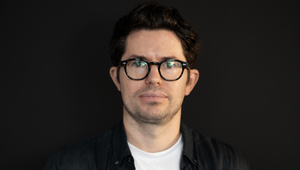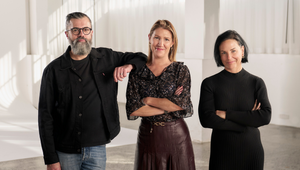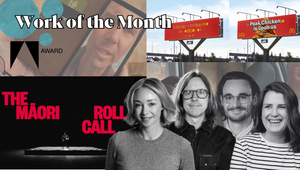
5 Minutes with... Jasmin Bedir

Jasmin Bedir has always had a unique relationship with creativity.
Growing up in a migrant household in Germany, she saw herself as "talent-free”. However, once she eventually set her sights on the creative world, she pursued a career in advertising.
Now the CEO of Innocean Australia, Jasmin has the opportunity to shape the industry to be more progressive, diverse, and innovative.
Speaking to LBB, Jasmin reflects on her early fascination with the industry, her experiences in Germany’s education system, and her determination to drive cultural diversity in Australian agencies.
She also touches on bold initiatives like ‘Fuck the Cupcakes’ and the philosophy of compassionate accountability.
LBB> Do you think you've always been a creative person?
Jasmin> No, actually, I never saw myself as creative. I thought I was really uncreative. As a kid, creativity wasn't a significant thing for me. I grew up with a very blue-collar, poor migrant background, where creativity meant maybe doing a bit of craft at home or painting pictures, and I'm talent-free when it comes to those things. So, I never really thought I would have a career in anything related to creativity.
LBB> Obviously, it's turned around a little bit. Has advertising always appealed to you as an industry?
Jasmin> I was told recently that during my A Levels in Germany, I declared my intention to have a career in advertising. I don't remember that at all, but I announced that I would pursue it. It felt interesting, because it was the opposite of what I had grown up with and seemed so much fun. So many young people created things that sounded incredibly inspirational and vibrant. I had no idea what that meant then, but I decided that's what I wanted to do.
In Germany, the education system is different. You can learn advertising as an actual trade. You go to school for two years and work in an agency in the afternoons, cycling through all the departments, like production, finance, and strategy, before writing exams at school. I'm a certified advertising tradesperson with a diploma; it's an actual profession. Coming from a migrant background where you have to do something correctly, wanting to work in this vibrant environment was a great way to appease my Turkish dad, who still doesn't quite understand what I do even 25 years later.
LBB> You mentioned that you are a certified advertising tradesperson, is that pretty uncommon in the local industry?
Jasmin> Yes, it's good that it's recognised. I find it strange that advertising is often entered here in Australia after completing marketing and communications degrees. In Germany, you can learn a trade, and if you want to pursue deep academia, you can do a university degree, which is longer than what’s typically available here. University degrees can be five to six years long, and you can take segments in areas like communications or marketing without needing a deep dive. Everything is free, which is the best part.
For someone without a lot of money, having free education and getting paid while learning a trade is incredible.
LBB>That’s a very different experience from what many go through here. You also mentioned your multicultural background— has that influenced your work and leadership style?
Jasmin> Definitely. I was a foreigner in Germany because my dad is Turkish and Muslim, and I grew up in a mixed-religion household. Germany has a large Turkish population, and my background made me aware of cultural differences. Moving to Australia, I was a foreigner again, as a German. Everyone thought my German accent made me incredibly efficient, which was an exciting change in perception. This awareness has made me more empathetic towards how difficult it is to fit in, and I recognise that a cookie-cutter approach to communication doesn’t work.
I’ve always had a finely tuned radar for cultural differences, which has helped me work effectively in an Asia-Pacific environment. When I came to Australia, I noticed the lack of diversity in agencies. I often wondered why everyone was blonde with blue eyes, especially in account management roles. It was a painful realisation of our little diversity in agencies, and I was always looking for people with different stories or backgrounds.
LBB> As the CEO, how do you foster a diverse workplace focusing on innovation and creativity?
Jasmin> This happens naturally. While I acknowledge challenges, I try to give opportunities to those from diverse backgrounds. If someone comes here on a visa from Pakistan or India with the qualifications, I want to give them a chance. Not everyone enjoys working in an environment where they are the only ones, but we've created a space where diverse individuals can come in and feel like they belong.
If you hire based on a tokenistic approach — like just getting one person of a different ethnicity or background — it often doesn’t work. Instead, we aim to find interesting people with great experience and give them a chance.
LBB> Can you tell me about the inspiration behind ‘Fuck the Cupcakes’?
Jasmin> The inspiration came when I was asked what we should do for International Women's Day. I hated that day because it often fell on the shoulders of women and minority groups to organise diversity and inclusion initiatives. I thought it was my responsibility to do something about it, so I asked my colleagues for their thoughts. They expressed their disdain for the day and its tokenism.
We decided to voice our feelings about it, and when we put it out there, it resonated with many women in the industry. This initiative developed from there, branching into different projects.
LBB> Have you found effective ways to engage both men and women in these conversations?
Jasmin> Yes, it has been a learning journey over the past three years. While getting women on board is relatively easy, engaging men is more challenging. We’ve become somewhat specialists in the topic of male purpose.
It's essential to recognise that young men today feel disillusioned and unsure of their roles. We must create an environment that acknowledges men's inclusion needs while holding them accountable. It’s a fine line between addressing feminism and ensuring men feel included in the conversation about progressive masculinity.















